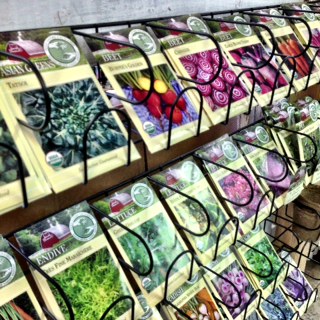
Gardeners: peruse a seed rack and feel just like a kid in a candy store again!
But if you’re new to gardening, we know that all the choices and terms on the back of the packets
can be just a bit overwhelming, and we’re here to help. This will
introduce you to some of the basic terms you will run into on a seed
packet or in a seed catalog.
Annual - A plant that lives out its entire life cycle in one season. It won’t come back after winter.
Biennial - A plant that takes two seasons to finish
its life cycle. It won’t bloom or go to seed until it’s experienced
winter and entered its second season.
Cold Tolerant/Cold Hardy - Plants that can tolerate cold temperatures and frost, such as spinach and carrots. Plants’ tolerance is rated by Plant Hardiness Zone. (In Granville, we are Zone 6a, which means our average annual minimum winter temperature is -10 to -5° F.)
Days to Maturity - How many days it takes from
planting until a plant is ready to eat, whether that means a leaf is big
enough or a tomato is ripe. Days can be counted from direct seed or
from transplant.
Direct Seed - Plant the seeds right into your garden soil outside, such as peas and carrots.
Frost Free Date (Last Frost Date) - When it’s safe
to put out frost sensitive plants like tomatoes. Here, that’s May 10th,
although last year Mother Nature proved us wrong with a freaky frost
later in May. Our advice: don’t rush to get those tomatoes out. They
won’t really take off until it’s warmed up consistently anyway.
Frost Sensitive - Plants that die as soon as frost
strikes. Cover them - with sheets, pots, or floating row cover - if you
want them to last longer.
GMOs or Genetically Modified Organisms (also called
GE - Genetically Engineered) - GMOs are created when the DNA from one
organism is inserted into another. A common example is Roundup Ready
corn. You generally do
not need to be concerned about GMOs in your backyard garden. Currently, nearly all GMOs are commodity crops
such as corn, soybeans and cotton. The two exceptions are papaya and
summer squash. There is, however, the possibility of contamination from
cross-pollination of related crops, and garden seed companies may test
for this.
Heirlooms - Heirloom seeds are open pollinated AND have a history of being grown, saved and shared within a family or community.
Hybrids - Are not the same thing as GMOs. Hybrids
are created through good old fashioned plant breeding by intentionally
“crossing” two different varieties. The benefit can be vigor or
uniformity. If you save seed from a hybrid plant, it will be sterile or
will
not be like the plant you had, so you have to buy new seeds each year.
Open Pollinated - Open pollinated seeds are bred the old-fashioned way, with the flow of pollen between plants of the same
variety. They will grow “true from seed” or “true to type” which means
that the offspring plant can turn out like its parent plant. (Unlike
hybrid plants that will display different characteristics in the second
generation if you save your own seeds and then plant them.)
Organic - Look for the green and white circle that
says “USDA Organic.” This means a farm or company complies with USDA
organic regulations and has paid a “certifying agency” to inspect them
and their records. Farms that use organic methods but are not
“certified” may call themselves Sustainable, Chemical Free, or Pesticide
Free, but these terms are not regulated.
Perennial - Plants that survive the winter and live for more than two years.
Plant Name - Or “scientific name.” That fancy Latin
name on a plant’s tag. The only way to really know you have the correct
species, since “common names” can be used for multiple species. Each
name contains at least the Genus and the species, and perhaps a variety.
(eg Broccoli:
Brassica oleracea var. italica)
Transplant -
Moving a young seedling from a pot or tray into the garden. Many plants
benefit from a start in a greenhouse, such as tomatoes and broccoli.
Wait to transplant until you have an established, stocky plant that has a
few sets of leaves and you can see the roots at the bottom of the pot.
Treated - Treated seeds are coated with a fungicide or insecticide to protect the seed from damage.
Viability - Seeds’ ability to sprout successfully
and survive. Viability goes down over time, and even if a seeds sprouts,
that doesn’t always mean the plant will have enough “vigor,” or be
strong enough to survive. Sometimes represented as a percentage or
“germination rate.”
Some types of seeds naturally last longer than others.


